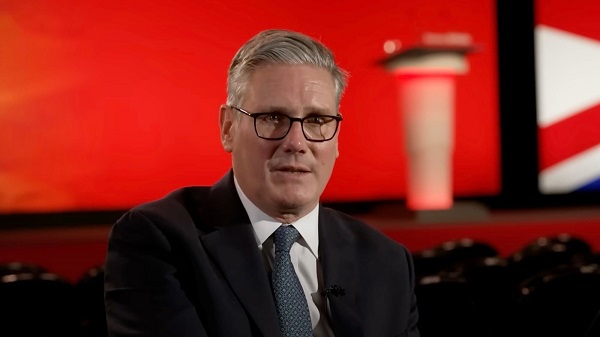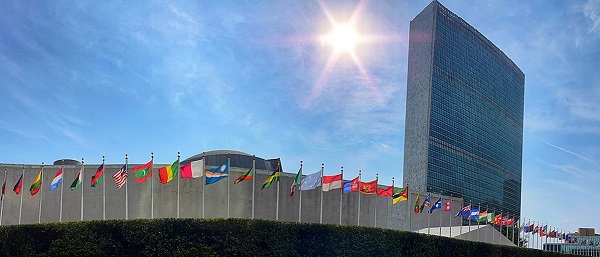Digital ID
Lawmakers advancing digital ID in effort to establish mass surveillance

Digital ID Schemes Make Strides in Congress Despite Rights Advocate Opposition
|
|
Business
UN, Gates Foundation push for digital ID across 50 nations by 2028

From LifeSiteNews
With 30 nations enrolled, the UN and Gates Foundation’s digital ID campaign signals accelerating efforts to create a global digital infrastructure that centralizes identity and data.
The 50-in-5 campaign to accelerate digital ID, fast payment systems, and data exchanges in 50 countries by 2028 reaches a 30 country milestone.
Launched in November 2023, the 50-in-5 campaign is a joint effort of the United Nations, the Bill and Melinda Gates Foundation, and their partners to rollout out at least one component of Digital Public Infrastructure (DPI) in 50 nations within five years.
DPI is a civic technology stack consisting of three major components: digital ID, fast payment systems, and massive data sharing between public and private entities.
30 countries have now joined the UN/Gates 50-in-5 DPI campaign to rollout Digital ID, Fast Payment Systems & Massive Data Exchanges between public & private entities https://t.co/dOYCfQHObt pic.twitter.com/yP6V7zxnUD
— Tim Hinchliffe (@TimHinchliffe) October 2, 2025
50-in-5 started with 11 first-mover countries, and with the count now at 30 the participating countries include:
Bangladesh, Brazil, Cambodia, Dominican Republic, Estonia, Ethiopia, France, Guatemala, Jamaica, Kazakhstan, Lesotho, Malawi, Mexico, Moldova, Nigeria, Norway, Senegal, Sierra Leone, Singapore, Sri Lanka, South Africa, South Sudan, Somalia, Togo, Trinidad and Tobago, Uganda, Ukraine, Uruguay, Uzbekistan, and Zambia.
The 50-in-5 campaign celebrated its 30-country milestone during a sideline event at the U.N. General Assembly in New York on September 22.
There, government officials, like Ukraine’s deputy prime minister, praised the work of 50-in-5 while the ministers of digital economy from Nigeria and Togo called for an interoperable digital identity system for the entire African continent.
Nigeria’s Minister of Communications, Innovation and Digital Economy Bosun Tijani said that each country could build their own digital identity scheme, but that they should all be interoperable with one another – demonstrating both the digital ID and data sharing as good potential use cases for DPI.
“Nations want to maintain their own ID databases, but I think we have a unique opportunity to apply strong data exchange system interoperability,” said Tijani.
“I think a digital identity system that can go with you wherever you are going on the African continent would be a fantastic example,” he added.
Nigeria's minister of Communications, Innovation & Digital Economy Bosun Tijani calls for Digital ID to be interoperable across all Africa: "A digital identity system that can go with you wherever you go on the African continent will be fantastic." 50-in-5 https://t.co/dOYCfQHObt pic.twitter.com/KB380uQrmd
— Tim Hinchliffe (@TimHinchliffe) October 2, 2025
In March 2025, the Nigerian government published a framework to develop national Digital Public Infrastructure that would leverage digital ID to track and trace “key life events” of every citizen from the cradle to the grave.
“Throughout a citizen’s life, from birth to old age, there are marked moments of significant life events requiring support or service from the government,” the paper begins.
“Some of these services include registration of births, antenatal healthcare, vaccines, school enrollment, scholarships, health insurance for business registrations, filing of taxes, etc.”
These “life events” require every citizen to have a digital ID:
The Federal Government of Nigeria is on a mission to appropriately deploy digital technology to support Nigerians through these significant and profound moments so they can integrate into the state and enjoy the benefits of citizenhood from cradle to old age.

Back at the 50-in-5 milestone event, Togo’s Minister of Digital Economy and Transformation Cina Lawson called for a free, cross-border, interoperable digital ID powered by the Modular Open Source Identity Platform (MOSIP).
MOSIP is a Gates-funded platform that “helps govts & other user organizations implement a digital, foundational identity system.”
Said Lawson, “We’ve initiated conversations with our neighbors, namely Benin, to have interoperability of our ID systems, but also Burkina Faso and other countries such as Senegal, because we’re using MOSIP platform, so what we do is that we host meetings of countries that are interested the platform, so that we could see how we [are] operating it and so on.”
“Our ID system, using the MOSIP platform, is really the ID that the majority of the Togolese will have because first of all it’s free, it doesn’t require to show proof of citizenship, and so on, so that is the ID card of the poorest of the Togolese,” she added.
Togo’s Minister of Digital Economy & Transformation Cina Lawson calls for free, cross-border, interoperable Digital ID using Gates-funded MOSIP platform. UN/Gates 50-in-5 event https://t.co/dOYCfQHObt pic.twitter.com/wPC4vpms9l
— Tim Hinchliffe (@TimHinchliffe) October 2, 2025
Lawson also spoke at the 50-in-5 launch event in November 2023, where she explained that Togo’s DPI journey began with the arrival of COVID-19.
First, the government set up a digital payments system within 10 days.
“We deployed it, and we were able to pay out 25 percent of all Togolese adults, and we distributed $34 million that the most vulnerable Togolese received directly through their mobile phones,” said Lawson.
Then, came vaccine passports.
“We created a digital COVID certificate. All of a sudden, the fight against the pandemic became really about using digital tools to be more effective,” she added at the time.
Today, Togo became the first sub-Saharan African country whose digital COVID-19 vaccination certificate is recognized by the @eu_commission. Travelers with a Togolese certificate will be able to validly present it in the EU & vice versa. @AmbUETogo @KoenDoens pic.twitter.com/Uy9mRF8bkU
— Cina Lawson (@cinalawson) November 24, 2021
To get an idea where DPI is heading, Ukraine’s Deputy Prime Minister Myhailo Fedorov gave a pre-recorded speech for the 50-in-5 milestone event, saying that his country was successful in building “the state in a smartphone” via the DIIA app, which had reached 23 million users.
“For every citizen, government should be simple, convenient, nearly invisible, and accessible in just a few clicks,” said Fedorov.
“Today, 23 million people use the DIIA app […] Since the launch of DIIA in 2020, Ukrainians and the state have saved about $4.5 billion to date.”
“This is the combined anti-corruption and economic effect of digitalizing services.”
“For us, it’s powerful proof of DIIA’s efficiency and the real impact of building a digital state,” he added.
Ukraine Deputy PM Mykhailo Fedorov praises DIIA Digital ID app, with 23M users, for being a "STATE IN A SMARTPHONE" & "BUILDING AN (INVISIBLE) DIGITAL STATE." An "ANTI-CORRUPTION/ECONOMIC EFFECT OF DIGITALIZING SERVICES." Includes "ONLINE MARRIAGE" 50-in-5 https://t.co/dOYCfQHObt pic.twitter.com/MUFwbW4Yyy
— Tim Hinchliffe (@TimHinchliffe) October 3, 2025
Speaking at the World Economic Forum (WEF) Global Technology Governance Summit on April 7, 2021, Fedorov told the panelists of the “Scaling Up Digital Identity Systems” session, that it was Ukraine’s goal to “enable all life situations with this digital ID.”
“The pandemic has accelerated our progress […] People have no choice but to trust technology,” Fedorov said at the time.
“We have to make a product that is so convenient that a person will be able to disrupt their stereotypes, to break through from their fears, and start using a government-made application,” he added.
The 50-in-5 campaign is a collaboration between the Bill and Melinda Gates Foundation, the United Nations Development Program, the Digital Public Goods Alliance, the Center for Digital Public Infrastructure, and Co-Develop; with support from GovStack, the Inter-American Development Bank, and UNICEF.
The Center for Digital Public Infrastructure is backed by Co-Develop and Nilekani Philanthropies.
Nandan Nilekani is one of the architects of India’s digital identity system, Aadhaar.
Co-Develop was founded by The Rockefeller Foundation, the Bill & Melinda Gates Foundation, Nilekani Philanthropies, and the Omidyar Network.
The Omidyar Network is a funder of MOSIP.
The Digital Public Goods Alliance lists both the Gates and Rockefeller foundations in its roadmap showcasing “activities that advance digital public goods,” along with other organizations and several governments.
At last year’s Summit of the Future, 193 nations agreed to the non-binding “Pact for the Future,” which dedicates a section in its annex, the “Global Digital Compact,” to implement DPI in member states.
One year later, the U.K. announced it was going to force Britons into mandatory digital ID schemes under the guise of combatting illegal immigration.
Reprinted with permission from The Sociable.
Business
UK Government Dismisses Public Outcry, Pushes Ahead with Controversial Digital ID Plan

Over 2.7 million signatures couldn’t move the needle on a dystopian plan already set in motion.
|
A UK government plan to introduce a nationwide digital identification system is moving ahead, despite a public backlash that saw more than 2.7 million people sign a petition urging its cancellation.
The proposal, first announced by Labour in September, would provide a digital ID to every UK citizen and legal resident aged 16 and above.
Prime Minister Keir Starmer claimed the new system would help strengthen border enforcement and reduce illegal employment, describing the ID, dubbed the “Brit Card,” as a tool to “make it tougher to work illegally in this country, making our borders more secure.”
The public response was overwhelmingly opposed. Warnings about centralized data collection, privacy intrusions, and increased state surveillance flooded public discourse.
Descriptions of the proposal ranged from a “dystopian nightmare” to fears of a gateway to “digital control.”
Not long after Labour’s announcement, a petition was created on the official UK Government and Petitions website.
|
 |
|
It quickly gathered enough signatures to qualify for parliamentary debate, a 100,000-signature benchmark, and within days surged past two million.
Despite reaching over 2.7 million signatures, the government issued a formal response rejecting the petition and restating its commitment to the scheme.
According to the response, published by the Department for Science, Innovation and Technology, the new ID system is part of Labour’s wider aim to modernize public services.
“We will introduce a digital ID within this Parliament to help tackle illegal migration, make accessing government services easier, and enable wider efficiencies. We will consult on details soon,” the government wrote.
Although a formal consultation process is expected in the coming weeks, involving employers, unions, and civil society organizations, the government made it clear that legislation to support the digital ID system is on the way.
Over time, it is expected to serve as a single access point for government services like benefits, tax records, and other official interactions, potentially eliminating the need for physical documents or multiple logins.
The government’s decision to push ahead with a national digital ID comes in the shadow of the recently enacted Online Safety Act, which has already laid the groundwork for sweeping identity checks across the internet.
That law, marketed as a way to protect children from harmful content, gave regulators broad authority to demand age verification for accessing a wide range of online services.
The result is an emerging digital framework where proving who you are, even just to browse or communicate, is becoming a condition of access.
|
-

 Alberta23 hours ago
Alberta23 hours agoClick here to help choose Alberta’s new licence plate design
-

 National1 day ago
National1 day agoDemocracy Watch Renews Push for Independent Prosecutor in SNC-Lavalin Case
-

 Business1 day ago
Business1 day agoOver two thirds of Canadians say Ottawa should reduce size of federal bureaucracy
-

 Business2 days ago
Business2 days agoTrump Admin Blows Up UN ‘Global Green New Scam’ Tax Push, Forcing Pullback
-

 Business2 days ago
Business2 days agoTrump Blocks UN’s Back Door Carbon Tax
-

 Media1 day ago
Media1 day agoCanada’s top Parliamentary reporters easily manipulated by the PMO’s “anonymous sources”
-

 Agriculture1 day ago
Agriculture1 day agoIs the CFIA a Rogue Agency or Just Taking Orders from a Rogue Federal Government?
-

 Red Deer2 days ago
Red Deer2 days agoYour last minute election prep: Common Sense Red Deer talks to the candidates





